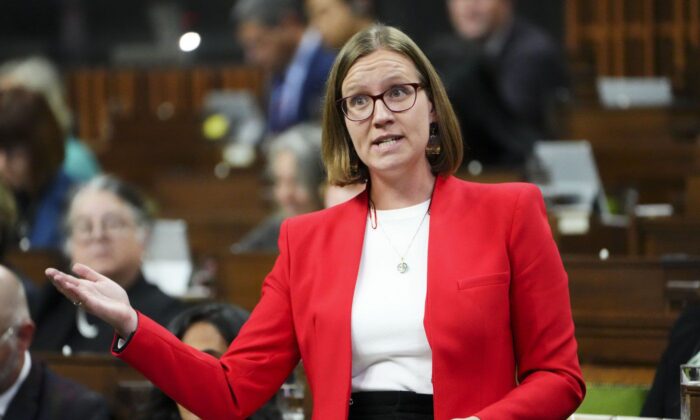Analysis: Exploring the Reasons for the Conservatives’ Endorsement and the Liberals’ Reluctance Towards the Bloc’s ‘Do or Die’ Pension Legislation
With the Conservative Party frequently talking about the need to balance the budget and the Liberals being more willing to open the public purse, it would seem out of character that the Conservatives vote in favour of the Bloc Québécois’ motion to advance a pension increase bill and the Liberals vote against it.
The Bloc’s Bill C-319 would give seniors aged 65 to 74 the same 10 percent increase in Old Age Security benefits previously granted to those aged 75 and over. The Parliamentary Budget Officer said implementing the bill would cost taxpayers over $3 billion per year, totalling $16.1 billion over five years.
On Oct. 1, a Bloc motion that called for the federal government to grant Bill C-319 a royal recommendation and expedite its passage passed, with the Bloc, Conservatives, New Democrats, and Greens voting in favour and the Liberals opposing. Liberal House Leader Karina Gould said the reason for voting against the motion was to prevent setting a precedent of an opposition day being used to get a royal recommendation.
There are a number of factors that are likely impacting the two parties’ voting decisions on this matter.
On the one hand, the Liberal government’s hesitation regarding the bill could be due to Canadians’ increasing concerns around government debt, and a fear that the legislation would be too broad and support a group that is generally better off than younger Canadians. In recent years, the Liberals have been targeting the country’s younger demographic.
“[The Liberals] can’t afford to say yes to it. It’s a huge amount of money,” Nelson Wiseman, professor emeritus of political science at the University of Toronto, told The Epoch Times.
The Conservatives, meanwhile, may have voted in favour of the motion to side with the Bloc against the Liberals in hopes of eventually bringing the government down with a non-confidence motion.
“Who wouldn’t like to corner the government on this matter?” said Richard Johnson, professor emeritus at the University of British Columbia, in an interview. He noted, however, that the Tories could be positioning themselves as being too beholden to the Bloc and the NDP in that case.
At the same time, while the country is undergoing an affordability crisis, the Conservatives may not want to be seen as voting against initiatives that would benefit certain segments of Canadians.
Rising Debt
The Bloc has said the Liberal government must pass two of its private member’s bills before Oct. 29—Bill C-319 on pensions, and Bill C-282 related to supply management—or it will begin discussions with the other parties to bring down the government. Given that the NDP recently ended the supply-and-confidence agreement that was keeping the Liberals in power, the government is facing increased risks that it may be brought down by a non-confidence vote.
The Liberals so far have not indicated if they’ll vote in favour of the Bloc’s demand on pensions. Following the Oct. 1 motion vote, Minister of Labour and Seniors Steven MacKinnon said Bill C-319 does not fit into the “very stringent criteria” for giving a bill royal recommendation, while Health Minister Mark Holland said $16 billion is “a lot of money.”
The Liberals have recorded a deficit every year, with the federal debt growing from $1.2 trillion in 2014 to $1.9 trillion in 2021. But in 2022, following the COVID-19 pandemic that saw the government rapidly increase support expenditure, Finance Minister Chrystia Freeland tabled what she called a “narrowly focused and fiscally responsible” budget to fight rising inflation.
In August 2023, Treasury Board President Anita Anand asked federal cabinet ministers to find $15.4 billion in government spending cuts by Oct. 2.
Wiseman says the Liberals are likely focused on how problematic Canadians perceive the debt to be.
“More and more people think, rightly or wrongly, that the government is spending more than it should,” he said.
Additionally, Wiseman noted that seniors are typically better off than younger Canadians, a group that helped propel Trudeau to victory in 2015 but has since largely shifted its support to the Conservatives. According to Statistics Canada, the average net worth of Canadians under 35 is $48,800, while those aged 64 and over have an average net worth of $543,200.
And these younger voters may be upset if they have to foot the bill for increased pension expenditures for an age-range of seniors that the Liberal government had previously said aren’t in as much need as those aged 75 and above, according to its data.
The Liberals’ latest budget signalled a shift toward supporting younger Canadians, with a focus on achieving “generational fairness” by raising taxes on wealthier and presumably older Canadians, providing more funding to build new homes and enhancing student aid and grant programs.
Expenditure Programs
Since becoming leader of the Conservatives, Pierre Poilievre has pledged to cap government spending by ensuring every dollar of spending is accompanied by a dollar in savings.
When it comes to the party’s support for Bill C-319, Conservative MP Tracy Gray said during a debate on Sept. 25 that it is “unacceptable that seniors are facing the challenges they currently are,“ while MP and Quebec lieutenant Pierre Paul-Hus said if the party did support the Bloc bill, it would ”have to find money somewhere else to save, because we can’t pay for everything.”
Johnson said the Conservatives, who have introduced two unsuccessful non-confidence motions since Parliament reconvened, merely want to have an election and see supporting the Bloc as the best way to achieve that. A successful non-confidence vote would require the Conservatives, NDP, and Bloc to all vote in favour of it.
“The other benefit is they get to corner the government on generosity to all people, even if it’s a completely missing notion of generosity in terms of objective need,” Johnson said.
Christopher Dummitt, a professor of Canadian studies at Trent University, also said the Conservatives likely supported the Bloc motion because it gives them an opportunity to side with the Bloc in eventually bringing down the government.
“The motion itself is non-binding and so it doesn’t lock the Conservatives into any specific support in practice. It is still, though, an odd decision on the surface,” he told The Epoch Times.
Amid an affordability crisis, although the Tories have made getting rid of the carbon tax a cornerstone of their branding strategy, they have in recent times appeared less willing to be shown to be strongly against high-profile assisting programs.
While the Conservatives have been outspoken about their rejection of the national pharmacare plan, House Leader Andrew Scheer didn’t give a clear answer as to whether the party would cancel the dental care program when asked on CTV’s “Question Period” last month. As well, the Tories voted with the other parties to adopt the Liberals’ anti-scab legislation in 2023, despite business groups expressing concern that the legislation would mean major disruptions to the economy when essential services are involved.





